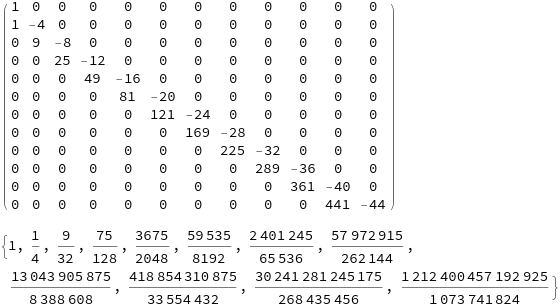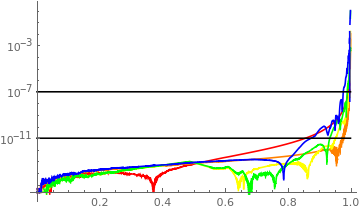How To: Calculate All Derivatives
Mat = Outer[Coefficient,
D[Dot[{1, D[-4 x (1 - x), x], -4 x (1 - x)},
{T[x], D[T[x], x], D[T[x], {x, 2}]}],
{x, #}] & /@ Range[0, 10], D[T[x],
{x, #}] & /@ Range[0, 11]] /. x -> 0;
Prepend[Mat, Prepend[Table[0, 11], 1]] // MatrixForm
LinearSolve[Prepend[Mat, Prepend[Table[0, 11], 1]],
Prepend[Table[0, 11], 1]]

And notice, this acutally requires only one initial condition, not even two!
How To: DIY NDSolve
DerMat[n_] := Join[
IdentityMatrix[n + 3][[1 ;; 2]],
Outer[Coefficient,
D[Dot[{1, D[-4 x (1 - x), x], -4 x (1 - x)},
{T[x], D[T[x], x], D[T[x], {x, 2}]}],
{x, #}] & /@ Range[0, n], D[T[x],
{x, #}] & /@ Range[0, n + 2]]];
GetNext[mat_, cond_, dx_] := With[{Tx = Dot[
LinearSolve[mat /. x -> cond[[3]], Join[cond[[1 ;; 2]],
Table[0, Length[mat] - 2]]],
1/#! x^# & /@ Range[0, Length[mat] - 1]]
}, {Tx, D[Tx, x], cond[[3]] + dx} /. x -> dx]
AbsoluteTiming[
FApprox = Function[{MAT},
Interpolation[
NestList[GetNext[MAT, #, .0001] &, {1, 1/4, 0},
9999][[All, {3, 1}]]]][DerMat[#]] & /@ {2, 3, 4, 5, 6} //
Quiet;]
Show[LogPlot[
Abs[FApprox[[#]][x] - 2/Pi EllipticK[x]], {x, .001, .9999},
PlotRange -> All,
PlotStyle -> {Red, Orange, Yellow, Green, Blue}[[#]]] & /@
Range[5],
LogPlot[10^(-#), {x, 0, 1}, PlotStyle -> Black] & /@ {7, 11},
PlotRange -> All]

Compare with earlier error plot. This quick hack is already doing better than NDSolve, and accepts initial condition at x=0. Any thoughts?